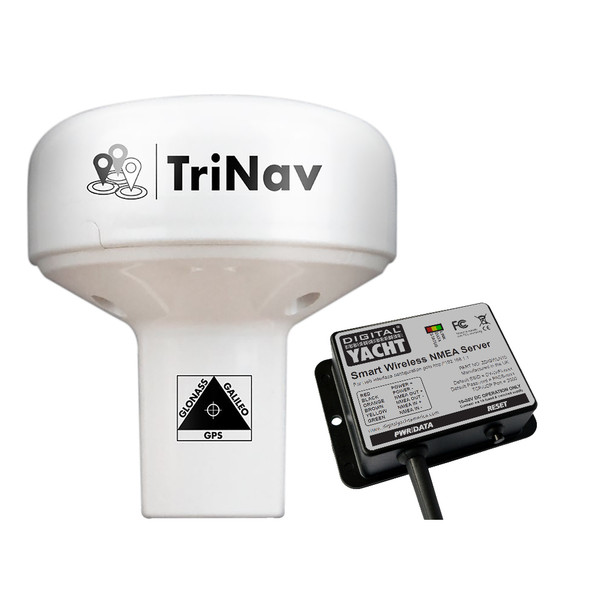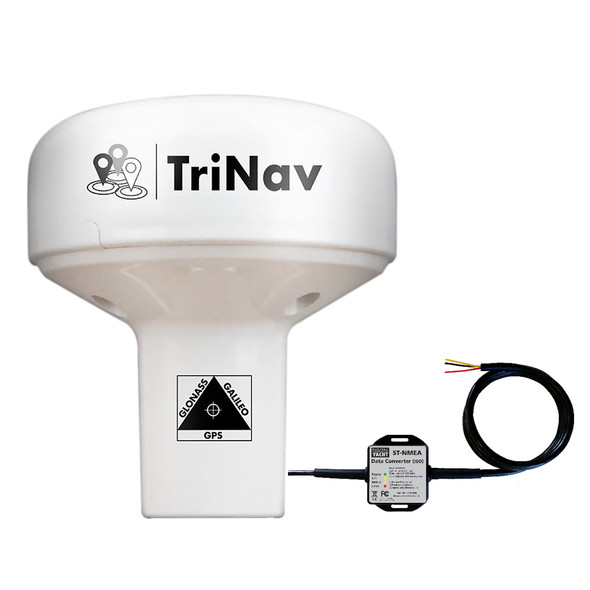Description
Digital Yacht GPS160 Sensor for GPS, Galileo and Glonass Satellite Systems, NMEA0183 Output
Model: ZDIGGPS160- 72 channel GPS, Glonass and Galileo GNSS positioning receiver
- Typically sub 1m accuracy thanks to TriNav™ technology —combines all satellite data for optimum accuracy
- Can be configured as dedicated GPS, Glonass or Galileo only device
- Sophisticated anti-spoofing algorithm for robust positioning performance and interference rejection
- User/field selectable 4800, 38400 and 115200 baud operation through simple internal DIP switches
- Multiple formats of NMEA data output including datum information —user configurable through internal DIP switches
- Up to 18Hz update rate (user selectable)
- Ultra low (<20mA) power consumption at 12V DC
- 10m cable
- Input for MOB switch/system —when activated generates synthetic AIS MOB NMEA output to activate MOB position on plotter
- Professional system (ECDIS) support with datum sentence structure (DTM/GBS/GNS/GRS/GSA/GST)
- Puck installation or fits 3rd party industry standard 1" x 14TPI threaded mount
Digital Yacht have unveiled their TriNav™ GPS160, a new, high performance positioning sensor using GPS, Glonass and the new Galileo satellite systems for exceptional positioning accuracies and redundancies. Typical accuracy is better than 1m and data can be set to output at up to 18Hz for smoother plotter track displays. TriNav™ software technology also improves positioning vulnerabilities that could occur through spoofing and local interference.
The device can be field programmed for a variety of modes such as single GNSS operation (eg Galileo only) as well as output configurations such as update rate, NMEA sentence structure etc
The GPS160 is available with a NMEA 0183 output (4800, 38400 and 115200 baud programmable) and a USB variant for PC, MAC and Linux. For NMEA 2000 systems, a bundle is available with a Digital Yacht iKonvert NMEA 2000 gateway allowing easy and flexible NMEA 2000 installation without the need for cumbersome drop cables.
The GPS160 also supports a simple external MOB (man-over-board) switch or device. When activated, the GPS160 creates a "synthesised" AIS SART MOB message on its NMEA output which can be interfaced with a local plotter for MOB identification. Most modern plotters support this with a clear MOB icon and instant bearing and distance information to navigate to the casualty.
Galileo is the new global navigation satellite system (GNSS) that has been developed over the past two decades. It joins the GPS and GLONASS systems and offers mariners a 3rd reliable positioning source. It is planned to be fully operational in 2020.
There are currently 22 satellites in usable condition (satellite is operational and contributing to the service provision), 2 satellites are in "testing" and 2 more are marked as not available. The final constellation should be deployed by 2020 and will consist of 30 satellites (24 operational and 6 spares).















